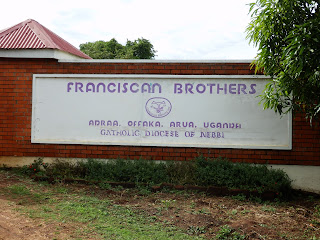 |
| The Bothers' Quadrangle and Guest Rooms |
The College is under the guidance of its principal, Brother Tony Dolan and it is his drive, vision, energy and commitment that have seen such amazing growth and positive change in a very few short years.
The College occupies a 50 acre site and
is about 20km from Nebbi. The site
includes a large farm where the students can learn through a very practical and
hands on curriculum. It provides training
in all areas of farming from soil management and conditioning, irrigation, pest
and disease identification and control, crop selection and management,
harvesting and crop storage, animal husbandry (pigs, cattle, goats and sheep),
poultry and bee-keeping. The training
courses also focus on business planning, marketing and all aspects of budgeting
and account keeping.
 |
| The College site |
 |
| The main quadrangle with (from left to right) the teaching block, student accommodation, kitchens, refectory and "adding value" block (under construction) and administration block |
The College maintains a strong focus on
adding value to the crops the students will go onto grow or the animals they
will rear. The value adding enterprises
focus on marketing skills, including identifying market gaps and exploiting
opportunities for new enterprises. These
skills are delivered through a wide range of courses for the intensive 6-week
course to short course of a few days focusing on particular areas of farming or
skill sets.
 |
| Sunflowers |
 |
| Students learning in the field |
September 2016 saw first group of students on 6-week course who were self-funded. These students have secured loans through a partnership between the college, ZEO and Centenary Bank. They have borrowed between UGS 1,500,000 (about £350) and 2,500,000 (about £580) to pay college fees and to set up their own farming enterprise after the course to put into practice and use the skills they have gained. The college welcomes this important innovation and has provided additional support to these students in business plan preparation and after graduation will provide ongoing support and assistance to ensure the success of this partnership.
A partnership such as this is a new phase in the college’s development and growth. If successful, it will provide a new route for students to come to the college. Up until now, most of the students have been sponsored through local and international NGO partnerships and programmes or through local government, etc. Self-funding students means the college should become less reliant for its student body on third parties. It should also men that other banks will be encouraged to offer special loan packages to potential future farming students.
The teaching at Adraa focuses on farmers being custodians of the land and that their responsibility is not just to provide food and income for themselves and their families today but equally to ensure that their children and their children’s children can inherit the land and equally be able to support their own families for the land.
Future developments will include how farmers and their families and communities can improve the sustainability of their core farming activity through “value adding”, i.e. this may include preparing food from their crops which can be sold at markets, establishing small businesses using other skills they have and potentially through developing eco-tourism opportunities.
Future developments will include how farmers and their families and communities can improve the sustainability of their core farming activity through “value adding”, i.e. this may include preparing food from their crops which can be sold at markets, establishing small businesses using other skills they have and potentially through developing eco-tourism opportunities.
As I have seen since arriving in Nebbi at the beginning of August 2016, this area of Uganda has the most spectacular scenery and is “raw” in terms of tourism. There is great wildlife, especially in the bird life, fantastic opportunities for trekking, great dark skies for astronomy (especially when the power fails!) and so very much more. The West Nile is a long way from any international airport but has so much else to offer making the 6 to 7 hour road journey well worth the effort!





Great work guys as always.
ReplyDeleteKeep up the good work.